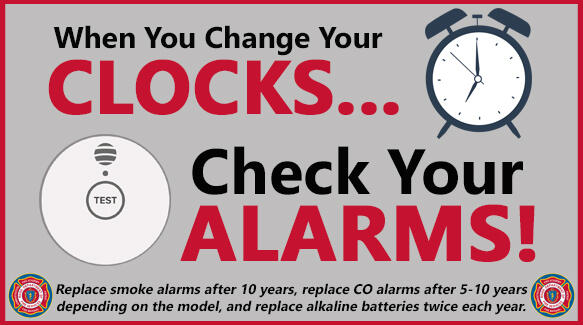- Department of Fire Services
Media Contact
Jake Wark, Public Information Officer

STOW — With the end of daylight savings time coming on Nov. 3, Massachusetts fire officials issued a seasonal reminder to check your smoke and carbon monoxide (CO) alarms and change the batteries when you change your clocks.
“Working smoke and CO alarms are vital to your safety at home,” said State Fire Marshal Jon M. Davine. “As we ‘fall back’ this weekend, protect yourself and the people you care for by putting fresh alkaline batteries in alarms that use them and replacing alarms that are out of date.”
Today’s smoke and carbon monoxide alarms have the manufacturing date printed on the back of the device. Smoke alarms should be replaced after 10 years, and CO alarms should be replaced according to the manufacturer’s instructions – usually 5, 7, or 10 years, depending on the model. Unless you have newer alarms with 10-year sealed batteries, this is also a good time to replace the alkaline batteries in all your alarms. And remember to test your smoke and CO alarms once a month to be sure they’re working properly.
Heating Season Brings Carbon Monoxide Hazards
Foxborough Fire Chief Michael Kelleher, president of the Fire Chiefs Association of Massachusetts, emphasized the importance of working carbon monoxide alarms as we enter the colder months.
“Carbon monoxide is a leading cause of poisoning deaths in the United States, and heating equipment is the main source of carbon monoxide in the home,” Chief Kelleher said. “We can’t see, smell, or taste carbon monoxide. Working CO alarms are the only way to detect this invisible killer.”
Replacement Alarms Should Have Sealed, Long-Life Batteries and a Hush Feature
Replacing an old single-station smoke alarm? Choose alarms that have sealed, long-life batteries and a hush feature. This makes it less likely that someone in the home will use the batteries for another device, forget to change them twice a year, or remove them when cooking causes smoke in the kitchen.
“Disabling a smoke alarm puts you, your loved ones, and everyone in the building at risk,” said State Fire Marshal Davine. “Never remove batteries from a smoke alarm except when putting fresh ones in.”
Alarms Should Be Listed by an Independent Lab
Massachusetts requires that all smoke and carbon monoxide alarms be listed by a nationally recognized testing laboratory such as Underwriters Laboratories (UL) or Intertek (ETL). Listed devices will have the laboratory’s mark on the back. In recent years, fire officials have seen numerous smoke and carbon monoxide alarms that were purchased online and either have counterfeit marks or no mark at all.
“Smoke and CO alarms can be the difference between life and death, but only if they work properly.” said Chief Kelleher. “When you purchase a new alarm, choose one from a well-known, national brand. We’ve seen many alarms that were purchased online and don’t meet the safety requirements of our State Fire Code. If the price seems too good to be true, then it probably is.”
Create & Practice a Home Escape Plan
“Changes to building construction and furnishings mean we have less time to escape a fire at home than ever before,” said State Fire Marshal Davine. “You could have just three minutes to get out safely.”
“Working smoke alarms and a practiced home escape plan are among the most fundamental and important tools for surviving a fire,” said Chief Kelleher. “Be sure everyone in the home knows what to do and where to go when the alarm sounds, including young children, older adults, and persons with disabilities.”
Senior SAFE
Adults over 65 are at disproportionate risk of dying in a fire, especially if they live in one- or two-family homes. Hundreds of fire departments across Massachusetts have grant-funded Senior SAFE programs that may provide assistance with alarm installation and testing. Seniors who need help testing, maintaining, or replacing smoke alarms should contact their local fire department or senior center for assistance.
For more information on smoke alarms or the Senior SAFE program, visit www.mass.gov/dfs or contact your local fire department.
###
